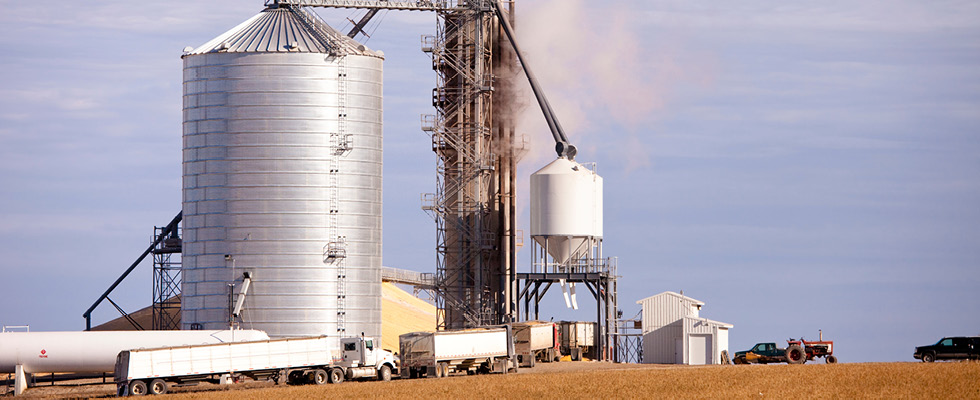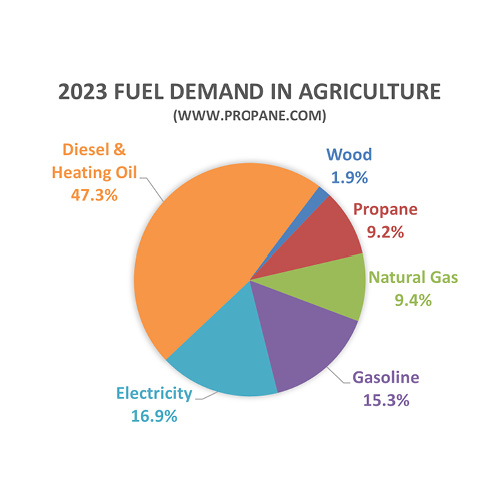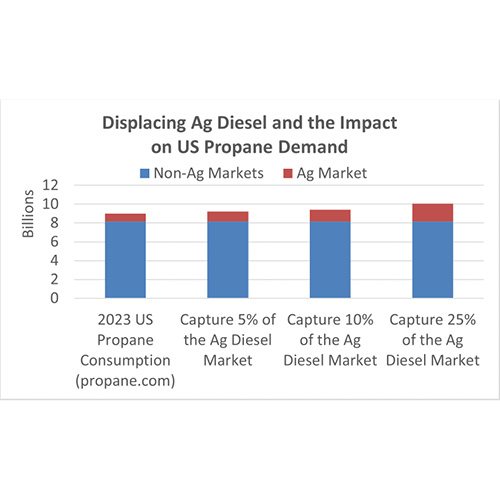
Propane use in agriculture has a strong and vital presence in the United States, with about 800,000 farms (approximately 40% of all farms in the U.S.) relying on propane in their operations. From grain dryers to irrigation engines, building heat, weed flamers and more, the saying “propane can do that” rings true across agricultural operations.
According to the Propane Education & Research Council (PERC), in 2023, U.S. agriculture operations consumed about 825 million gallons of propane, accounting for 9.2% of total U.S. propane consumption. Propane checks all the boxes that ag operations need: reliability, availability, transportability and affordability. Yet, the potential in this market is untapped.
What Is the Growth Opportunity for Propane Use in Agriculture?
According to 2023 data from PERC, the total energy demand from all fuels used in U.S. agriculture equaled approximately 8.9 billion gallons when converted to propane gallon equivalents, which is similar to the 2023 U.S. propane consumption of nearly 9 billion gallons. Of the total fuel demand in agriculture, propane contributes about 9.2%, while diesel and heating oil account for 47.3%, or 4.2 billion equivalent gallons of propane. That 4.2 billion gallons of diesel represent potential growth for the propane industry and present a substantial market opportunity that could have a transformative impact on the propane market.
 The propane industry doesn’t need a large share of the ag diesel market to make a difference. A modest 5% displacement of ag diesel with propane would create new demand for 211 million gallons of propane annually. If we were to capture 25% of the ag diesel market, the ag propane market would more than double, adding an additional 1.056 billion gallons of demand, growing propane demand by 11.7% and increasing the total U.S. demand to over 10 billion gallons.
The propane industry doesn’t need a large share of the ag diesel market to make a difference. A modest 5% displacement of ag diesel with propane would create new demand for 211 million gallons of propane annually. If we were to capture 25% of the ag diesel market, the ag propane market would more than double, adding an additional 1.056 billion gallons of demand, growing propane demand by 11.7% and increasing the total U.S. demand to over 10 billion gallons.
Our industry can capture these gallons. The ag industry is heavily reliant on diesel fuel. The U.S. Energy Information Administration (EIA) estimates that diesel fuel accounts for approximately 44% of direct energy consumption in agriculture, powering approximately 75% of farm equipment, including all the large, hard-to-decarbonize equipment like combines and row-crop tractors. This reliance on diesel creates several challenges for farms in the U.S. and creates a serious opportunity for the propane industry.
Dollars & Cents
 Let’s start with finances. Diesel prices can be volatile, subjecting farmers to unpredictable swings in fuel costs that can significantly impact operating margins. Per EIA, since 2020, average (on-road) prices for diesel fuel have fluctuated from a low of $2.39 per gallon in October 2020 to a peak of over $5.81 in June 2022, illustrating the kind of price volatility that can strain farm budgets during critical seasonal operations. Because the U.S. is a net exporter of propane, propane prices are less susceptible to the international market volatility that affects imported fuels.
Let’s start with finances. Diesel prices can be volatile, subjecting farmers to unpredictable swings in fuel costs that can significantly impact operating margins. Per EIA, since 2020, average (on-road) prices for diesel fuel have fluctuated from a low of $2.39 per gallon in October 2020 to a peak of over $5.81 in June 2022, illustrating the kind of price volatility that can strain farm budgets during critical seasonal operations. Because the U.S. is a net exporter of propane, propane prices are less susceptible to the international market volatility that affects imported fuels.
Meanwhile, propane has proved to save money compared to diesel. Propane irrigation engines regularly save farms up to 40% in operations and up-front costs. Mobile vehicles have shown fuel cost savings up to 50% compared to diesel, along with lower maintenance costs. And on top of those savings, PERC’s Propane Farm Research Program, along with other state and federal programs, provides financial assistance toward the purchase of new propane-powered farm equipment.
Infrastructure Advantages
One of propane’s most significant advantages for agricultural displacement is the existing infrastructure network serving rural America. Propane is an ideal off-grid fuel and is readily available where other fuels simply cannot reach. While environmental demands are causing users to consider new sources of energy, the propane industry’s vast distribution network can deliver dependable energy without the huge investments in new infrastructure required for many other alternative fuels.
At the farm level, transporting and storing diesel can present logistical challenges for rural operations. Unlike propane, diesel fuel can degrade over time and requires fuel stabilization additives for long-term storage. Moreover, diesel spills pose environmental risks that require Environmental Protection Agency spill prevention plans, adding regulatory complexity for farm operations. This is important for all ag operations but will be of particular interest to those near waterways or who use flood irrigation.
Theft prevention is another practical advantage for propane. The specialized storage and handling requirements for propane make it much less susceptible to fuel theft compared to diesel, providing security benefits for rural operations.
Propane Use in Agriculture Environmental Drivers
Environmental considerations also impact agricultural fuel choice decisions. Propane produces approximately 20% fewer life-cycle carbon emissions than diesel. Propane also generates significantly lower emissions of nitrogen oxides (NOx), with recent data showing propane-powered equipment producing 96% fewer NOx emissions than comparable diesel equipment.
The lower maintenance costs with propane engines are largely due to the clean-burning nature of propane. Diesel engines require complex emission control systems to comply with emissions regulations, including diesel exhaust fluid, diesel particulate filters and periodic regeneration cycles that can cause costly downtime during critical farming operations. Propane, with its three carbon atoms, is inherently clean-burning and complies with strict emissions standards using relatively simple solutions like a three-way catalyst.
Technology Breakthroughs
The agriculture industry is familiar with propane equipment, but they are not generally familiar with the latest technological advances in propane equipment that can dramatically expand propane’s potential in agriculture. Recent advancements in engine technologies have proved that propane can offer engine efficiency and power output comparable to diesel engines. This is a big deal — no, this is a huge deal — and not enough decision-makers in agriculture equipment manufacturing know about it.
A Practical Path Forward for Propane Use in Agriculture
Propane is ready to meet the growing energy challenge the agriculture industry is facing. Because propane is available, affordable, versatile, reliable and inherently clean, it is the ideal fuel for farms navigating economic uncertainty, tightening environmental regulations and frustratingly complex equipment. The propane industry offers a pragmatic, scalable solution that lowers costs, insulates operations from fuel volatility and reduces equipment downtime. Capturing even a modest share of this market, where we are already delivering fuel, could unlock hundreds of millions of gallons in new propane sales annually.
In short, the conditions are ripe. The right technologies exist. The infrastructure is in place. And the need for solutions that are cleaner, cheaper and more secure has never been greater. It’s time to elevate propane in America’s farming future. But what do we do?
Moving established markets like this is a challenge. It takes more than a handful of people and more than a few organizations to change the status quo. It will take all of us to create market-moving momentum. As you talk to your agriculture customers, tell them about the opportunities to use propane in other parts of their farm. If you know ag equipment dealers, talk to them about the latest advances in propane equipment technologies. When you talk with your local and state government officials, let them know about the advantages of propane in providing energy security to their constituents. Every conversation is a push in the right direction.


